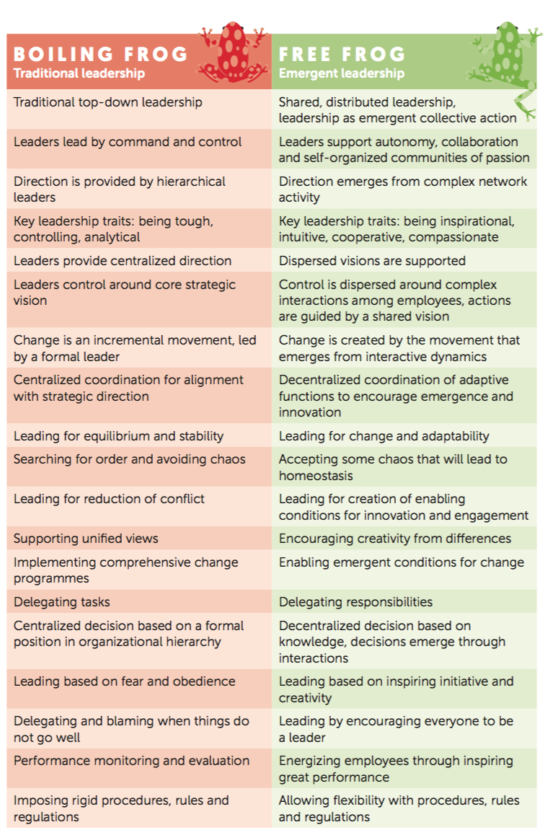Organizations are being killed slowly by their own inertia. A new form of leadership can rescue them, writes Professor Vlatka Hlupic
[button type=”large” color=”black” rounded=”1″ link=”https://issuu.com/revistabibliodiversidad/docs/dialogue_q4_2017_full_book/70″ ]READ THE FULL GRAPHIC VERSION[/button]
Many organizations today are like frogs swimming in slowly heated water. Unaware of the forthcoming danger, they are complacent. They are unwilling to change, shift to a better place, and jump out of the increasingly dangerous hot water and move to safety.
They are surfing on the edge of chaos – markets change faster and faster, unforeseen influences require quick adaptation, and changing demographics of the workforce demands different management practices. Many businesses are becoming global, helped by advances in connectivity and digitization. This internationalization causes competitor profiles to constantly shift. There is an increasing emphasis on innovation, cooperation and collaboration.
The management dogmas of the past fail to suit the new landscape. New thinking is required. Organizations and societies are better able to adapt by taking a path based on values, integrity, purpose, compassion, continuous innovation and the commitment to make a positive difference and safeguard the future for young generations.
Passion and performance
Continuous learning and innovation are becoming progressively more important for sustainable performance. Engaged employees who feel passionate about their work create innovative cultures, but can be held back by outdated management practices. Managers need to create the conditions for unleashing the power of human passion, wisdom and ingenuity. Chief executives, management thinkers and practitioners have come to the view that we cannot use old solutions for new problems. We have never experienced such a magnitude of changes before. There is a dramatic need for a shift to a new mindset and new management practices. I call it ‘The Management Shift’. Many organizations, both in the public and private sectors, need to make profound systemic changes, not just to management practices, but to organizational cultures, business processes, regulatory frameworks, work arrangements and work ethics.
Traditionally managed organizations resemble supertankers that struggle to respond to sudden changes in their environment and fail to change course in time. Modern organizations should be managed and led like sailboats – a general direction is to be determined, but the journey towards the destination should be flexible, depending on the environmental conditions.
Management thinking has been traditionally influenced by scientific discoveries. Conventional management approaches have been based on the Newtonian machine model that focuses on hierarchical linearity: a culture based on rules, command and control, and formal relationships.
It is no more than a metaphor. And while such an approach might have worked well in predictable and stable environments when the objective was efficiency in the production economy, there is ample research evidence that, in dynamic and complex business environments, this traditional approach inhibits creativity and innovation, and decreases motivation, engagement and productivity.
Management innovation is a greater potential source of competitive advantage than traditional innovations of products, services or technology. Einstein’s insights into relativity have influenced other disciplines such as art, music, religion or literature at the beginning of the last century. The main paradigm was that rational and analytical were inseparable from emotional and intuitive. Yet this key finding has not affected management thinking until recently. The main reason was the ‘if it ain’t broke, don’t fix it’ mantra.
From the 1950s, the traditional management model flourished, with wealth creation for industrial nations based on increasing productivity. Then, with all the technological changes and increasing importance of knowledge, new business models emerged (such as Amazon.com), where talent, collaboration and innovation enabled faster commercialization of ideas.
However, embracing these new management approaches requires a shift in the mindset, which is not easy to achieve, and most organizations today are still managed using conventional, Newtonian management approaches.
The Management Shift
Not surprisingly, organizations, institutions and societies are in crisis. Performance continues to decline whether measured through Return on Assets or Return on Invested Capital; US firms’ Return on Assets has dropped progressively since 1965, despite rising labour productivity. The average life expectancy of Fortune 500 companies has steadily decreased from 75 to 15 years in the last 50 years. Furthermore, data shows that only 25% of the workforce is passionate about their work, despite the plethora of techniques and resources spent on learning and development. Global figures for engagement show that 80% of employees are less than fully engaged at work.
‘The Management Shift’ is based on people, purpose, collaboration, trust, transparency, community and autonomy (see figure below). Authority is distributed and decisions are based on knowledge rather than on a formal position in organizational hierarchies. Organizations are managed holistically as complex adaptive systems. The new approach brings better engagement, productivity, innovation and profit – this is the future of work and we can implement it now. Only by a complete change in leadership mindset can we rescue the frogs from the warming water, and set them free.

— Professor Vlatka Hlupic is a management consultant, executive coach and author
[button type=”large” color=”black” rounded=”1″ link=”https://www.linkedin.com/groups/5125875″ ]JOIN THE CONVERSATION[/button]

